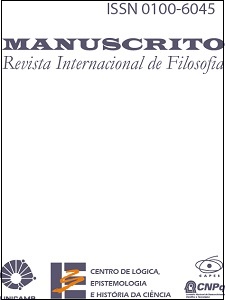Abstract
My aim is to point out the most relevant contributions of Classical Greek Philosophy to the study of the relations between Language and Thought. I see them expressed in the continuing task of conceptual innovation that has accompanied the classical Greek tradition from its inception. I begin with the conception of Being, developed in the Parmenides Poem, showing how it corresponds to the execution of a program of investigation of the real, conceived from the evidence provided by language and thought. Particular attention is paid to the emergence of the conception of 'truth' implicit in B7.1 as a comment to B6. Platonic reception to the theory of Eleata is referred to in the Theories of Forms and Anamnesis and complemented by the problematic and critical revision of the Theteto and Sophist. Two structuring perspectives of the real are defined, the first supported by the conceptual range derived from the analysis of the Greek verb 'to be' (einai): 'to be', 'essence', 'existence', 'substance', 'entity' , “One”, “all / all”; the second refined by the critique of thought and the disambiguation of einai's senses. I conclude with Aristotle's critique of Platonic conceptions, expressed in his conception of Being, as “said in many ways”, supported by the articulating theories of thought, language and Being: of the construction of the universal, from experience; and meaning. In addition to introducing the distinctions of “Substance First / Second” (see 'individual' and 'universal') and 'essence / existence', in the treatises on language the Stagyrite fixes the concepts of 'name', 'discourse', “Proposition”, “truth / falsehood”, refining conceptions spread in Platonic dialogues.References
ALLEN, R.E. “Participation and Predication in Plato’s Middle Dialogues”. In: Studies in Plato’s Metaphysics. London, pp. 43-60, 1965.
BARNES, J., SCHOFIELD, M., SORABJI, R. (eds.). Articles on Aristotle I. London, 1975.
BROWN, L. “Being in the Sophist: a Syntactical Enquiry”. In: G. Fine (ed.). Plato I. Oxford, pp. 455-478, 1999.
CALOGERO, G. Studi sull’Eleatismo. Roma, 1932.
CASERTANO, G. Parmenide, il metodo, la scienza, l’esperienza. Napoli, 1978.
CHARLES, D. Aristotle on Meaning and Essence. Oxford, 2000.
COOPER, J. “Plato on Sense Perception and Knowledge: Theaetetus 184 to 186”. Phronesis, 15, pp. 123-146, 1970.
CURD, P. “Eleatic Arguments”. In: Method in Ancient Greek Philosophy. Oxford, pp. 1-28, 1998.
FINE, G. (ed.). Plato I. Oxford, 1999.
FRÄNKEL, H. “A Thought Pattern in Heraclitus”. In: A.P.D. Mourelatos (ed.). The Presocratics. New York, pp. 214-228, 1974.
FURLEY, D., ALLEN, R.E. (eds.). Studies in Presocratic Philosophy. London, 1979.
FURTH, M. “Elements of Eleatic Ontology”. In: A.P.D. Mourelatos (ed.). The Presocratics. New York, pp. 241-270, 1974.
GRAHAM, D.W. “Empedocles and Anaxagoras”. In: A.A. Long (ed.). The Cambridge Companion to Early Greek Philosophy. Cambridge, pp. 159-180, 1999.
HÖLSCHER, U. “Anaximander and the Beginnings of Greek Philosophy”. In: D. Furley, R.E. Allen (eds.). Studies in Presocratic Philosophy. London, pp. 281-322, 1979.
KAHN, C. Anaximander and the Beginnings of Greek Cosmology. New York, 1960.
KAHN, C. The Verb ‘Be’ and its Synonyms. Dordrecht/Boston, 1966.
LESHER, J.H. “Early Interest in Knowledge”. In: A.A. Long (ed.). The Cambridge Companion to Early Greek Philosophy. Cambridge, pp. 225-249, 1999.
LONG, A.A. (ed.). The Cambridge Companion to Early Greek Philosophy. Cambridge, 1999.
McKIRAHAN Jr., R. “Zeno”. In: A.A. Long (ed.). The Cambridge Companion to Early Greek Philosophy. Cambridge, pp. 134-158, 1999.
MOHR, R.D. The Platonic Cosmology. Leiden, 1985.
MORAVCSIK, J. Platão e o Platonismo. Aparência e Realidade na Epistemologia e na Ética. São Paulo, 2006 (Primeira edição original: 1992)
MOURELATOS, A.P.D. The Route of Parmenides. New Haven/London, 1970.
MOURELATOS, A.P.D. (ed.). The Presocratics. New York, 1974.
NEHAMAS, A. “Self Predication and Plato’s Theory of Forms”. In: Virtues of Autenticity. Princeton, pp. 176-195, 1999.
OWEN, G. “Plato on Not-Being”. In: G. Fine (ed.). Plato I. Oxford, pp. 416-454, 1999.
OWEN, G. “Tithenai ta phainomena”. In: J. Barnes, M. Schofield, R. Sorabji (eds.). Articles on Aristotle I. London, pp. 113-126, 1975.
SANTAS, G.X. “The Form of the Good in Plato’s Republic”. In: G. Fine (ed.). Plato I. Oxford, pp. 247-274, 1999.
SANTOS, J.T. “’Existir’” e ‘Existência’, em Platão”. Disputatio, 16, pp. 33-57, 2004.
SANTOS, J.T. “El nacimiento de la Verdad”. Methexis, XVII, pp. 7-24, 2004a.
SANTOS, J.T. “Epistêmê e Formas no Teeteto”. In: J.T. Santos (org.). Do Saber ao Conhecimento. Lisboa, pp. 43-62, 2005.
SANTOS, J.T. “O Tempo na narrativa platónica da Criação”. Hypnos, 17 (no prelo).
SANTOS, J.T. (org.). Do Saber ao Conhecimento. Lisboa, 2005.

